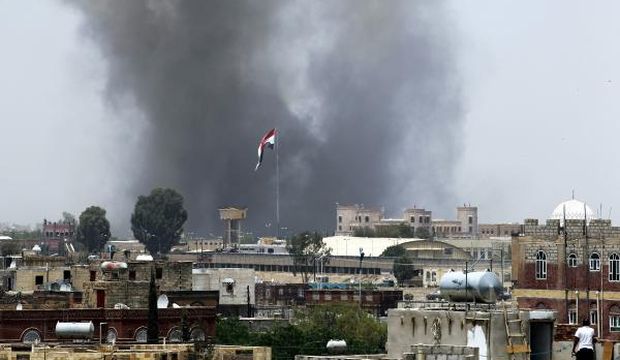
Smoke rises above the military academy following an airstrike carried out by the Saudi-led coalition, in Sana’a, Yemen, on April 11, 2015. (EPA/Yahya Arhab)
Cairo, Sana’a and Riyadh, Asharq Al-Awsat—In the latest sign of his growing rift with the Iran-backed Shi’ite Houthi movement, ousted former Yemeni president Ali Abdullah Saleh is proposing a peace initiative to stop the fighting in the country, sources told Asharq Al-Awsat on Saturday.
Saleh, who was ousted in 2012 after mass protests against his more than three decade rule, initially backed the Houthi coup in Yemen in February and their takeover of the capital Sana’a in September.
Saleh allegedly helped ease the advance of the movement’s militias across the country, via elements in the Yemeni military and security establishments still loyal to him, who effectively created a security vacuum across the country which the Houthis could then fill.
However, the sources, who requested anonymity in order to protect their identities, said Saleh had sent the assistant secretary-general of his General People’s Congress (GPC) party, Abu Bakr Al-Qirbi, on a foreign mission to Arab countries to propose a peace initiative drafted by the former president to end the ongoing war in Yemen.
They added that the Houthis, who had been consulted regarding the initiative, were, however, “reluctant” to abide by it as they were keen to “resolve things on the ground” themselves.
“The initiative is the one most likely to achieve consensus [between all parties] and a solution in Yemen. It proposes the cessation of all military operations in the country and for the [Houthi] militias to vacate all ministries and government institutions in Sana’a and Aden.”
The initiative also proposes that militias belonging to the Houthis and “any other faction” leave Aden and return all weapons seized from the state to “non-aligned elements from the military,” the sources added. It also calls for the reformation of the Yemeni military institution in coordination with other Arab countries.
Other sources in Yemen also told Asharq Al-Awsat the initiative represented a clear break by Saleh from his ties to the Houthi movement.
They said the initiative would seek to implement the outcomes of the Peace and Partnership agreement signed between the Houthis and Yemen’s internationally recognized President Abd Rabbuh Mansur Hadi in September, which stipulated the movement vacating all government institutions and ceasing hostile action, as well as those of the Gulf Initiative, drafted in 2013 to determine the country’s post-Saleh political road map.
Saleh’s initiative also proposes the reinstatement of the cabinet of former premier Khaled Bahah, who was placed under house arrest by the Houthis in January.
Speaking to Asharq Al-Awsat on Saturday, Yemen’s Foreign Minister Yassin Riyadh asked all Yemeni diplomatic missions not to meet with Qirbi or consider the proposal.
He said the legitimate political authority in Yemen, represented by Hadi, had allowed Qirbi to leave the country, but it had stipulated that “he should respect the legitimate [political] authority in Yemen, or keep silent and not undertake any [unilateral] political activity of any kind.”
“But Qirbi changed his mind after leaving the country and decided to undertake a foreign mission to continue the political efforts of ousted former president Ali Abdullah Saleh and his GPC party,” Yassin added.
Meanwhile, speaking on Saturday from the Riyadh Airbase, Saudi Defense Ministry spokesman Brig. Gen. Ahmed Asiri told reporters that Operation Decisive Storm—the current Saudi-led offensive in Yemen—had thus far conducted a total of 1,200 air raids on Houthi targets in the country since the operation began on March 25, adding that the highest number of raids conducted in a single day so far came to 120.
“Our air operations have now become much more accurate after we began tracking the movement of targets on the ground . . . [these efforts] require accuracy and the need for a constant air presence [by coalition warplanes] over Yemeni airspace, and this is why the airstrikes have increased recently,” he said.
Meanwhile, on Sunday, during a meeting with his French counterpart Laurent Fabius, Saudi Foreign Minister Prince Saud Al-Faisal blasted calls by Iran’s Supreme Leader Ayatollah Ali Khamenei for a ceasefire in Yemen.
“How can Iran call for us to stop the fighting in Yemen?” he said, in comments carried by the Associated Press. “We came to Yemen to help the legitimate authority, and Iran is not in charge of Yemen.”
Khamenei on Thursday labeled the airstrikes being carried out by the Kingdom and its Arab allies “crime and genocide,” with Iran’s President Hassan Rouhani also calling for an immediate ceasefire in the country.
Saudi Arabia and its Arab allies, which include Egypt, Jordan, the UAE and Bahrain, allege that Iran has been directly backing the Houthi coup in Yemen and is seeking to destabilize the Gulf region. Tehran has denied the accusations.
Arafat Madabish and Nasser Al-Haqbani contributed additional reporting from Sana’a and Riyadh.
